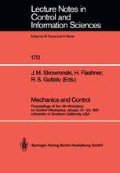Abstract
We start from a controllability problem for a Fokker-Planck equation, termed Problem A. A solution (v*, φ*) to that problem is constructed via a Theorem of Jamison, under proper assumptions. Theorem 2 gives a sufficiency condition concerning the given initial and terminal data for that solution to exist. Theorem 3 states that v* is an optimal feedback control for a stochastic optimal control problem with constraint on the end-state, termed Problem B, and further v* corresponds to the minimum of an entropy distance. At last Problem A is transformed into a controllability problem for a stochastic differential equation, termed Problem C: the solution to Problem C corresponding to the one constructed in Problem A is the Markovian process satisfying the given end conditions in a set of reciprocal processes of Jamison.
Preview
Unable to display preview. Download preview PDF.
References
K. Kime and A. Blaquière, From two Stochastic Optimal Control Problems to the Schrödinger Equation, in Modeling and Control of Systems in Engineering, Quantum Mechanics, Economics and Biosciences. Lecture Notes in Control and Information Sciences 121. Springer-Verlag Berlin Heidelberg 1989.
A. Blaquière, Girsanov Transformation and two Stochastic Optimal Control Problems. The Schrödinger System and Related Controllability Results, in Modeling and Control of Systems in Engineering, Quantum Mechanics, Economics and Biosciences. Lecture Notes in Control and Information Sciences 121. Springer-Verlag Berlin Heidelberg 1989.
L. de Broglie, Une tentative d'interprétation causale et nonlineaire de la mécanique ondulatoire, Gauthier-Villars, Paris, 1956.
E. Schrödinger, Sitzungsbericht der Preußischen Akademie, Phys. Math. Classe, 144 (1931); "Une analogie entre la mécanique ondulatoire et quelques problèmes de probabilités en physique classique", Annales de l'Institut Henri Poincaré, 11, 300 (1932).
S. Bernstein, "Sur les liaisons entre les grandeurs aléatoires", in Verh. des intern. Mathematikerkongt. Zürich, Band 1 (1932).
A. Beurling, "An Automorphism of Product Measures", Annals of Mathematics, Vol. 72, No. 1, July 1960.
B. Jamison, "Reciprocal Processes", Z. Wahrscheinlichkeitstheorie ver. Gebiete 30, 65 (1974).
A. Wakolbinger, A Simplified Variational Characterisation of Schrödinger Processes, J. Math. Phys., 30, 2943, 1989.
D. Dawson, L. Gorostiza, and A. Wakolbinger, Shrödinger processes and large deviations, J. Math. Phys. 31 (10), October 1990.
H. Föllmer, "Random fields and diffusion processes", Ecole d'été de Saint Flour 1986, Lecture Notes in Mathematics, Springer-Verlag Berlin.
A.M. Il'in, A.S. Kalashnikov, and O.A. Oleinik, Linear Equations of the Second Order of Parabolic Type, in Russian Mathematical Surveys, edited by K.A. Hirsch, Vol. XVII, Macmillan and Co. Ltd, London, 1962.
W. H. Fleming and R. Rishel, Deterministic and Stochastic Optimal Control, Springer-Verlag, Berlin, 1975.
A. Blaquière, Sufficiency Conditions for Existence of an Optimal Feedback Control in Stochastic Mechanics, Dynamics and Control 1, 7–24, 1991.
W. H. Fleming and Sheunn-Jyi Sheu, Stochastic Variational Formula for Fundamental Solutions of Parabolic PDE, Appl. Math. Optim. 13: 193–204, 1985.
R. S. Lipster and A. N. Shiryayev, Statistics of Random Processes I, General Theory, Springer-Verlag, Berlin Heidelberg, 1977.
D. W. Stroock and S. R. S. Varadhan, Multidimensional Diffusion Processes, Springer-Verlag, Berlin Heidelberg, 1979.
E. B. Dynkin, Théorie des processus markoviens, Dunod, Paris, 1963.
M. Nagasawa, “Transformations of Diffusion and Schrödinger Processes”, Probab. Th. Rel. Fields 82, 109–136 (1989).
Author information
Authors and Affiliations
Editor information
Rights and permissions
Copyright information
© 1992 Springer-Verlag
About this paper
Cite this paper
Blaquière, A. (1992). Controllability of a Forkker-Planck equation, the Schrodinger system, and a related stochastic optimal control. In: Skowronski, J.M., Flashner, H., Guttalu, R.S. (eds) Mechanics and Control. Lecture Notes in Control and Information Sciences, vol 170. Springer, Berlin, Heidelberg. https://doi.org/10.1007/BFb0004305
Download citation
DOI: https://doi.org/10.1007/BFb0004305
Published:
Publisher Name: Springer, Berlin, Heidelberg
Print ISBN: 978-3-540-54954-3
Online ISBN: 978-3-540-46606-2
eBook Packages: Springer Book Archive

